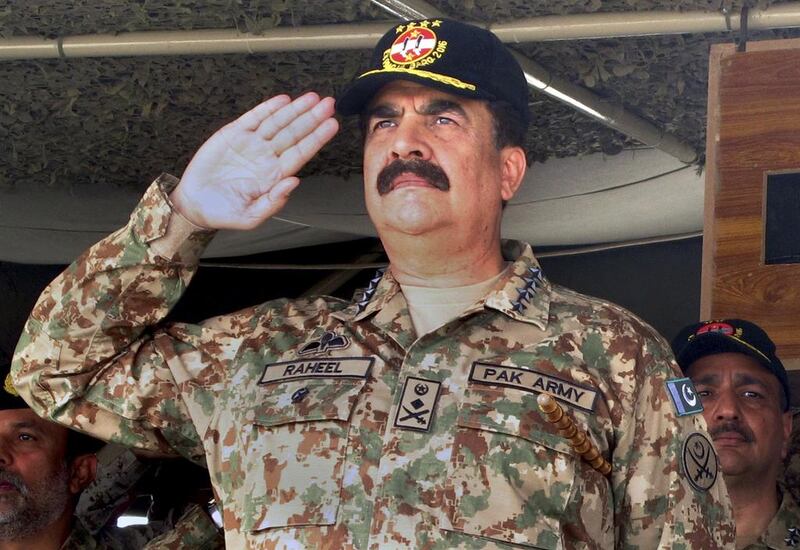Abu Dhabi // Pakistan’s government has approved a former army chief to command the Saudi-led Islamic military alliance after months of uncertainty.
The move highlights the precarious domestic and regional tightrope Islamabad must walk as it seeks to balance ties with Saudi Arabia and Iran.
Iran’s ambassador to Pakistan, Mehdi Honardoost, said on Monday that Islamabad had notified officials in Tehran before the approval, but “it did not indicate that Iran was satisfied with this decision or it had accepted”, the Iranian state-run Irna news agency reported.
Pakistan last week issued a no-objection certificate for recently retired former chief of army staff Raheel Sharif to head the alliance of 40 Muslim-majority countries that Saudi officials say is aimed at fighting terrorism in the region. Analysts say the alliance is more likely meant as a show of force by Riyadh aimed at Tehran.
__________________________________
Riyadh-Islamabad military ties
■ Pakistan in talks with Saudi Arabia to send combat troops to protect the kingdom
■ How Pakistan's military offers the Gulf much more than boots on the ground
_________________________________
The alliance excludes Iraq, which has a Shiite-dominated government, and it is unclear whether the member countries have agreed on its priorities. So far no forces dedicated to the coalition have been announced.
While Mr Sharif has not commented on his new position, Pakistani security analysts say a precondition included a role as a mediator between the rivals locked in a cold war in the region.
Mr Sharif “will use his experiences and knowledge to remove internal misunderstandings among Muslim countries” and his role will benefit “anti-alliance countries, including Iran”, Pakistan’s national security adviser Nasser Janjua said last week. Neither Riyadh nor Tehran have publicly endorsed this aspect of the retired general’s new position.
For Pakistan, the appointment is a prestigious one – both Turkey and Egypt had hoped to lead the alliance, according to a Gulf-based official. It also comes as Pakistan pushes to reset relations with Saudi Arabia and other GCC countries following a period of tension after Islamabad declined a Saudi and Emirati request to join the coalition fighting to restore the internationally-recognised government in Yemen.
For Riyadh, Mr Sharif’s appointment gives the alliance the symbolic heft of the Muslim world’s only nuclear power and its largest military, as well as the former general’s experience leading an effective offensive against the Pakistani Taliban.
But the appointment has drawn deep criticism in Pakistan from the political opposition who fear that the country is tipping too heavily toward the kingdom. Many fear that if the alliance appears to target Iran or its allies it could exacerbate sectarian tensions domestically as well as relations with Tehran. Around a quarter of Pakistan’s 190 million people are Shiite, and they are proportionally represented in a military that prides itself on being non-sectarian.
Pakistani officials have been at pains to emphasise that the moves to support the kingdom will not come at Iran's expense. Last month, The National revealed that Pakistan plans to deploy additional troops to Saudi Arabia for internal security support.
Relations between Islamabad and Tehran have been rocky, particularly over the issue of anti-Iran militants based in Balochistan province, but high-level engagement has increased in recent months.
Most recently, Pakistani prime minister Nawaz Sharif and Iran’s president Hassan Rouhani met at a regional conference last month.
Pakistan aims to balance Iran’s growing ties with India, but is also seeking to work with Tehran for a settlement in Afghanistan and cooperation to combat ISIL.
Pakistan and Russia are also enhancing bilateral security ties, and Islamabad will likely seek to avoid antagonising Moscow’s close regional ally Tehran.
Last month, Pakistan's current army chief, General Qamar Bajwa, told Mr Honardoost, Iran's ambassador, that enhanced military cooperation between their two countries "will have a positive impact on regional peace and stability," Dawn newspaper reported.
The “Pakistan Army greatly values historical relationship between the two brotherly countries which can never be compromised at any cost.”
tkhan@thenational.ae





